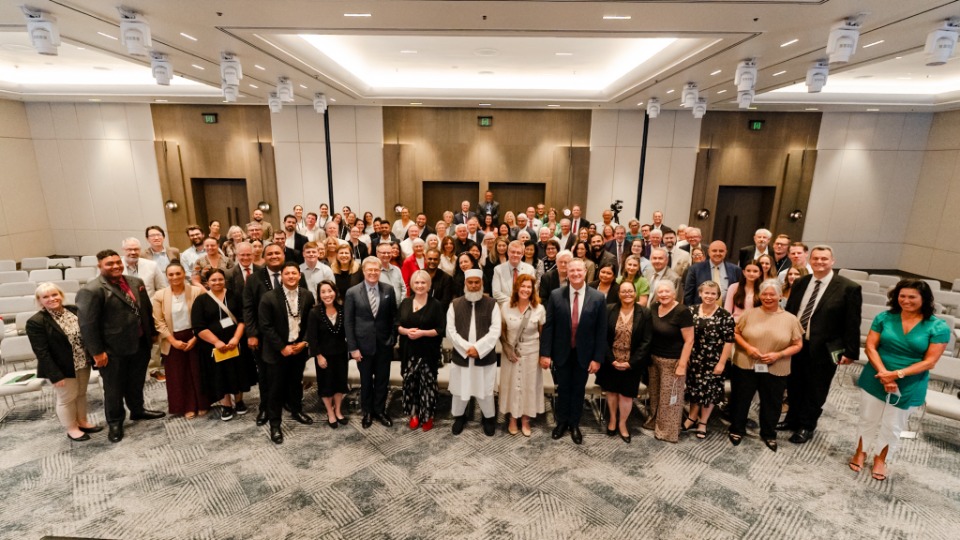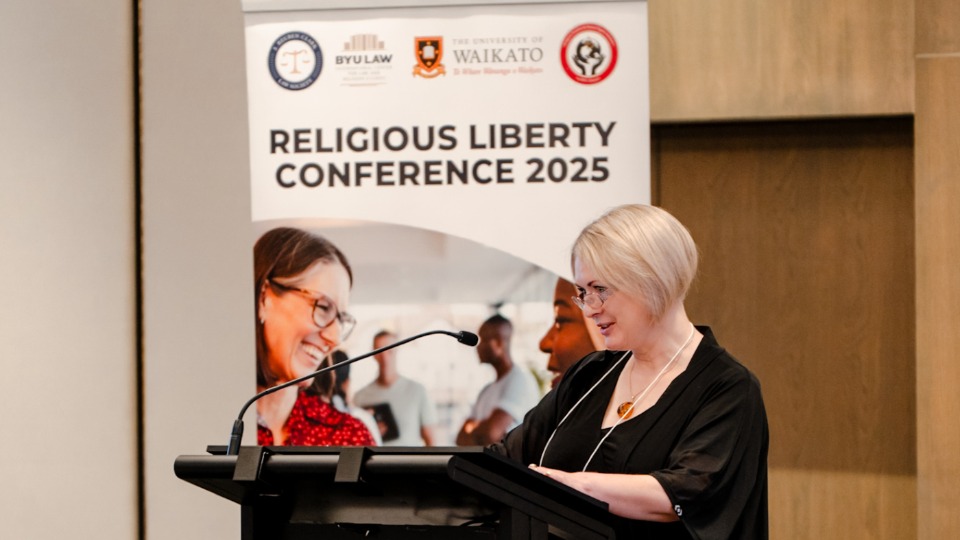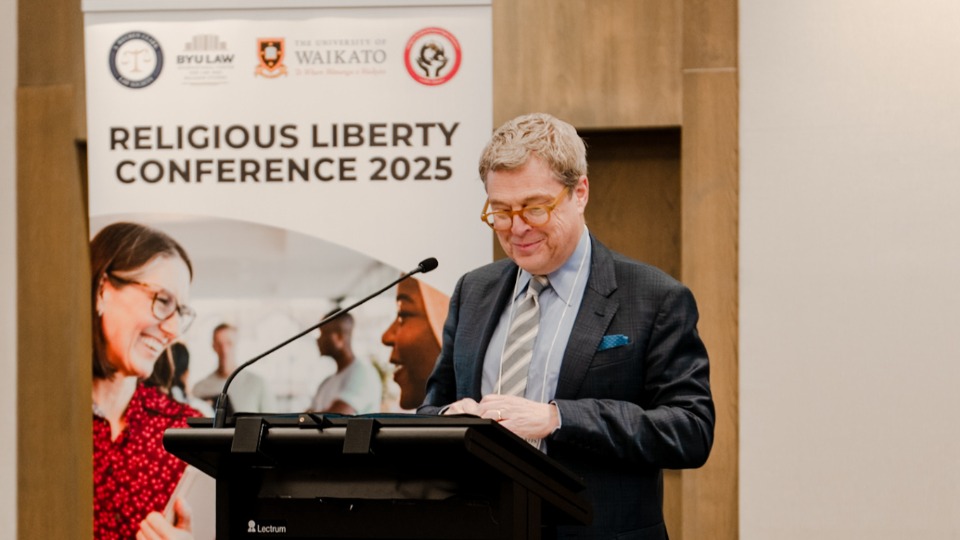Government officials, faith representatives, academics, and other experts in freedom of religion or belief gathered for a conference in Auckland on 21 to 23 February 2025 to explore the theme: “Freedom to do, to be, and to become—Enhancing individuals’ opportunities to believe and live as they choose within the framework of the law.”

Attendees at a conference in Auckland, New Zealand 21-23 February 2025.
Attendees at a conference in Auckland, New Zealand 21-23 February 2025. Participants explored the state of freedom of religion or belief in New Zealand, Australia and Oceania.© 2025 by Intellectual Reserve, Inc. All rights reserved.Sponsors of the conference were: The International Center for Law and Religion Studies at BYU Law School (USA); The University of Waikato Te Piringa – Faculty of Law (NZ); The Religious Freedom and Human Dignity Initiative at BYU–Hawaii (USA); and The J. Reuben Clark Law Society (NZ).
Keynote speaker, University of Waikato academic, Dr Juliet Chevalier-Watts, said she was speaking from a unique perspective—as a white atheist tied by her ethnicity to colonialism. As a charity law specialist, she said charities and churches do great good in society as they help address the challenges of individuals, families, and communities. She argued that laws should protect faiths and faith-based charities so they can continue to alleviate suffering and lift lives.
 DOWNLOAD
DOWNLOADIn his remarks, Professor Brett Scharffs, Director of the International Center for Law and Religion Studies at BYU Law School, suggested that people of faith need to seek understanding and unity through dialogue; and, building on this, to celebrate and cultivate the virtues of freedom of religion or belief.
 DOWNLOAD
DOWNLOADHe said that as people of faith live with courage and character, according to their beliefs, the case for religious freedom will be more clearly and strongly expressed—and better understood by others. Professor Scharffs spoke of the need for people of faith to nurture “habits of the head, habits of the heart, and habits of the hand,” to bring their faith into the public square in meaningful and helpful ways.
In presentations and discussions over two days, threats to freedom of religion or belief were identified, such as secular, political, and atheistic challenges to the validity and benefits of faith in society.
- Sheikh-Mohammad-Amir,-Mufti-of-New-Zealand,-and-Sister-Catherine-Jones-smsm-of-the-Archdiocese-of-Wellington,-participate-in-a-panel-discussion.-Auckland,-21-February-2025.
- Ram-Lingam-of-the-Auckland-Interfaith-Council.
- Dr-Juliet-Chevalier-Watts-21-February-2025
- Professor-Brett-Scharffs.-Auckland,-New-Zealand.-21-February-2025.
- Kim-Smith,-Manager,-Constitutional-Arrangements-and-Treaty-Team,-Ministry-of-Justice,-New-Zealand.-21-February-2025.-Auckland,-New-Zealand.
- Elder-Jared-Ormsby-introduces-religious-freedom-brochures-for-several-countries-of-Oceania.-These-brochures-provide-information-in-Pacific-languages-about-freedom-of-religion-or-belief-laws-in-each-legal-jurisdiction.-Auckland,-New-Zealand.-21-February-2025.
- Brigham-Young-University--Hawaii-faculty-and-students-in-Auckland,-New-Zealand-22-February-2025
- Attendees-at-a-conference-in-Auckland,-New-Zealand-21-23-February-2025.
| Temple Square is always beautiful in the springtime. Gardeners work to prepare the ground for General Conference. © 2012 Intellectual Reserve, Inc. All rights reserved. | 1 / 2 |
Responses to these challenges included calls to civility, mutual respect, bridge-building, and coordinated community and humanitarian efforts underpinned by a respect for human dignity and fairness for all.
Presenters spoke on a wide range of topics and through the lenses of several religious and cultural perspectives. Threads that united all that was shared included the need to listen to understand others, and to work together to do good in our communities.
Four General Authority Seventies of The Church of Jesus Christ of Latter-day Saints participated in the conference, including two members of the Church’s Pacific Area Presidency, Elder Taniela B. Wakolo and Elder Jeremy R. Jaggi. Elder Steven R. Bangerter and Elder K. Brett Nattress, visiting from the United States, also participated in the conference.
Thanking those who shared presentations at the conference, Elder Taniela B. Wakolo said, “The words of Joshua, from the Old Testament, resonate with us today: ‘Choose ye this day whom ye will serve…’
He continued, “Faith and belief are deeply personal matters. Our speakers are helping us more clearly understand this challenge in a pluralistic society, with respect, human dignity, and kindness.”
Elder Jeremy R. Jaggi shared the experience of when he and his wife, Amy, welcomed their first child into the world and into their family. Soon after her birth, the baby was inconsolable. Elder Jaggi recalled that he took the baby in his arms and sang to her a song that his mother sang to him when he was a little boy, a Latter-day Saint favourite, “I am a child of God.”
Elder Jaggi said that as he had been singing this song to their baby for several months while she was in her mother’s womb, when the baby heard the song again, and recognised his voice, she was immediately soothed.
He said that we need to listen and respond to God’s voice to us individually, and as communities, and to seek greater peace, love, and faith.
Elder Bangerter invited conference delegates to visit the Auckland New Zealand Temple which is opening to the public this week ahead of its dedication in April. He thanked those attending the conference, expressing love for them, and gratitude for their faith and the goodness of their lives.
This was a homecoming for Elder Nattress, and his wife, Sister Shawna Nattress, who lived in New Zealand for five years as Elder Nattress served as a member of the Pacific Area Presidency up until 2023. As he offered a blessing over one of the meals during the conference, Elder Nattress thanked God for the gift of His Son Jesus Christ, and for all who came to the conference to share, to learn, and to strengthen faith and friendships.
New Zealander, Elder Jared Ormsby, serves as an Area Seventy (regional leader) in The Church of Jesus Christ of Latter-day Saints. In his remarks, Elder Ormsby thanked delegates and other guests for bringing their experiences, perspectives, and wisdom to the conference. He argued that societies that value religious freedom are more likely to flourish.
Elder Ormsby introduced religious freedom brochures which provide information in national languages about freedom of religion or belief laws in several legal jurisdictions.
Professor Paul Rishworth is the former Dean of the Faculty of Law at the University of Auckland, a member of the Legislative Design and Advisory Committee, and convenor of the New Zealand Law Society’s Human Rights and Privacy Committee. Professor Rishworth closed the conference with remarks about some of the history of religious freedom in the New Zealand context.
He quoted Judge Learned Hand's famous Spirit of Liberty Address which teaches us that no constitution can protect liberty if it is not in the hearts of its people, and the spirit of liberty lies in the quality of not being too certain that you are right, and in being willing to listen to people with whom you may disagree.
Saturday evening, delegates had the opportunity to tour the Auckland New Zealand Temple. On Sunday, they visited a mosque and a marae. These visits of sacred sites enabled conference attendees to learn more about faith traditions other than their own.
“In this our 25th anniversary year, the ICLRS held this pivotal conference gathering together experts in law and religion from New Zealand, Australia, and the broader Pacific region to enrich our understanding of how to link arms and build bridges as peacemakers in the defense of religious freedom,” said Associate Director Hannah Smith, the organiser of the conference.
Images courtesy of Rosalind Malolo